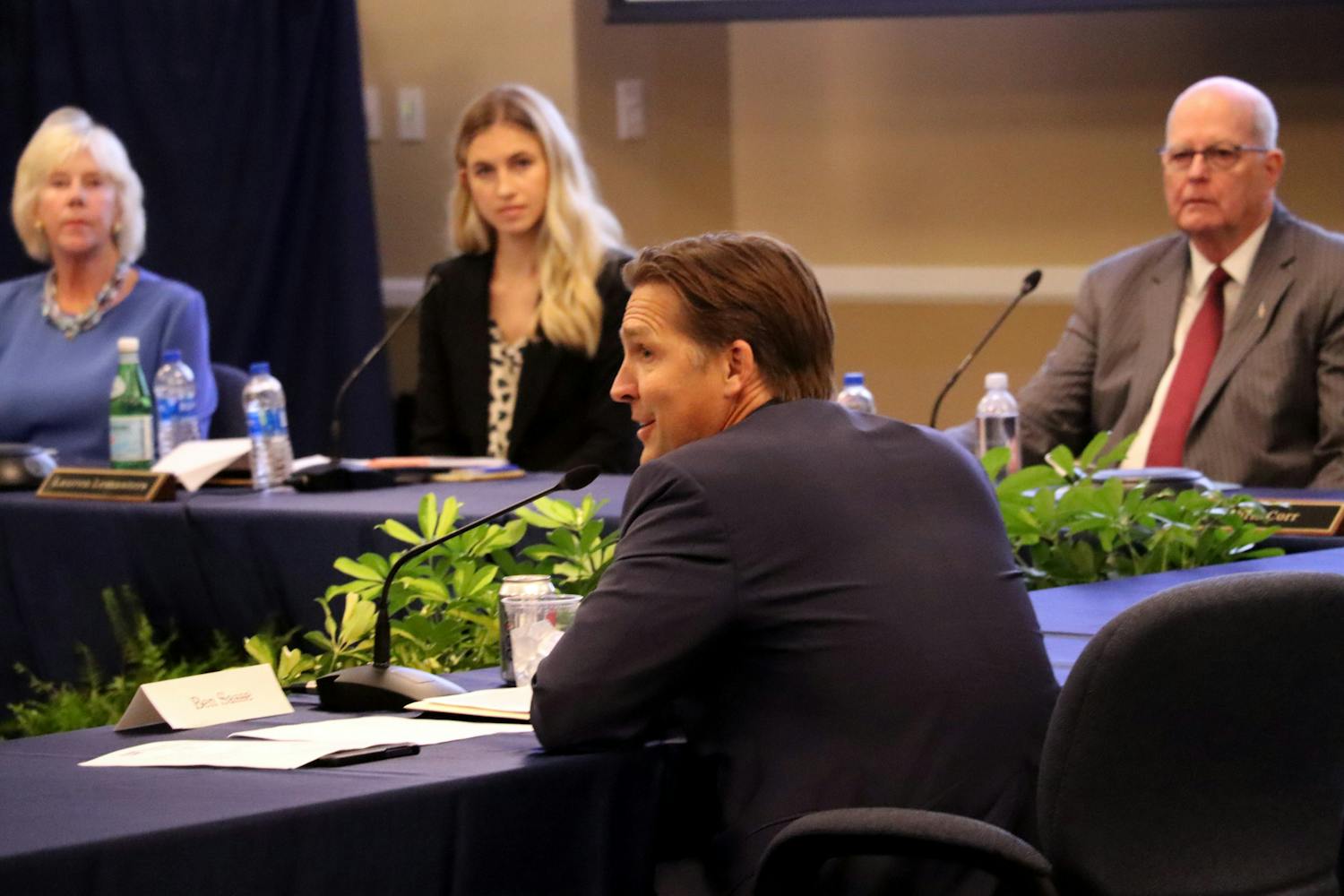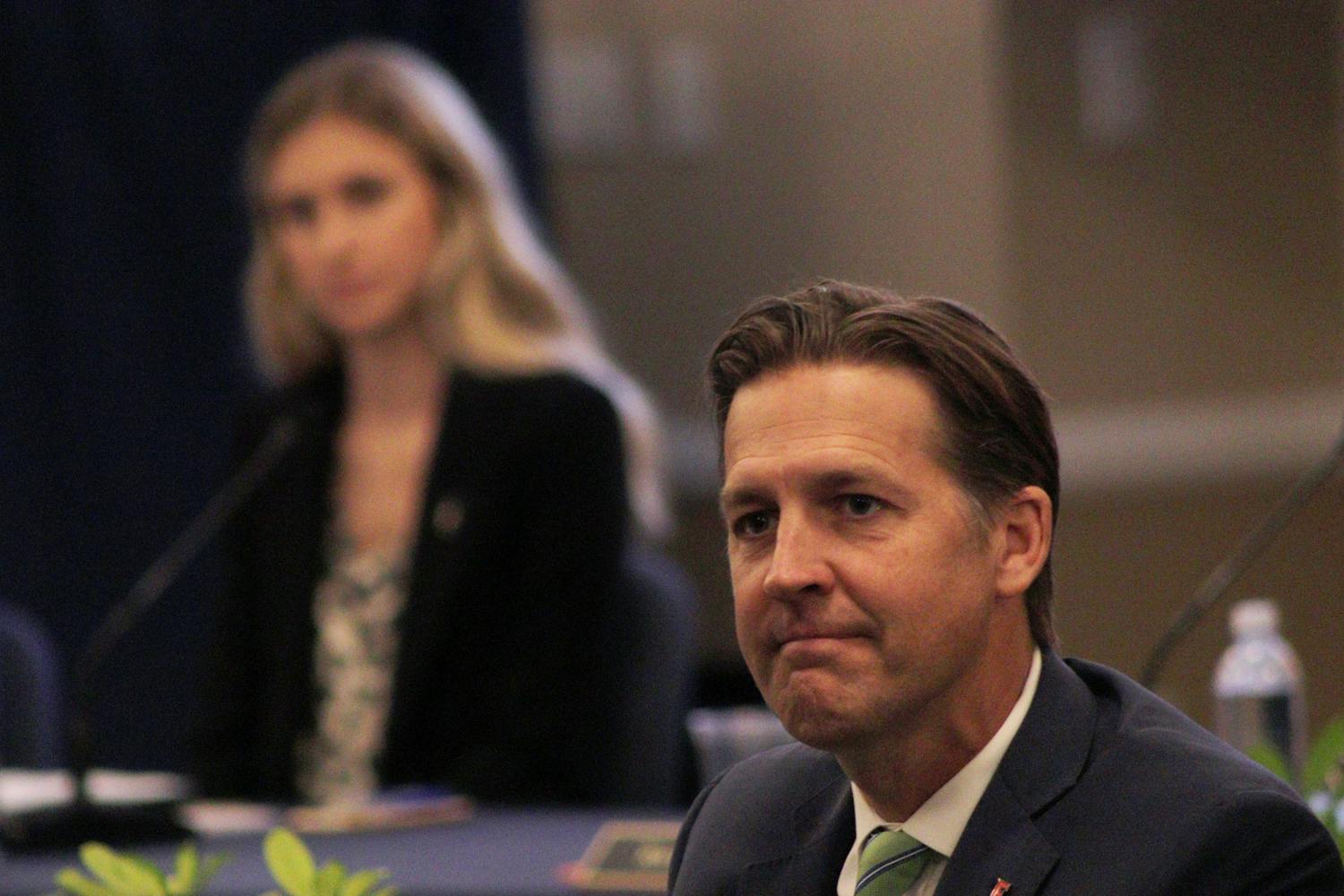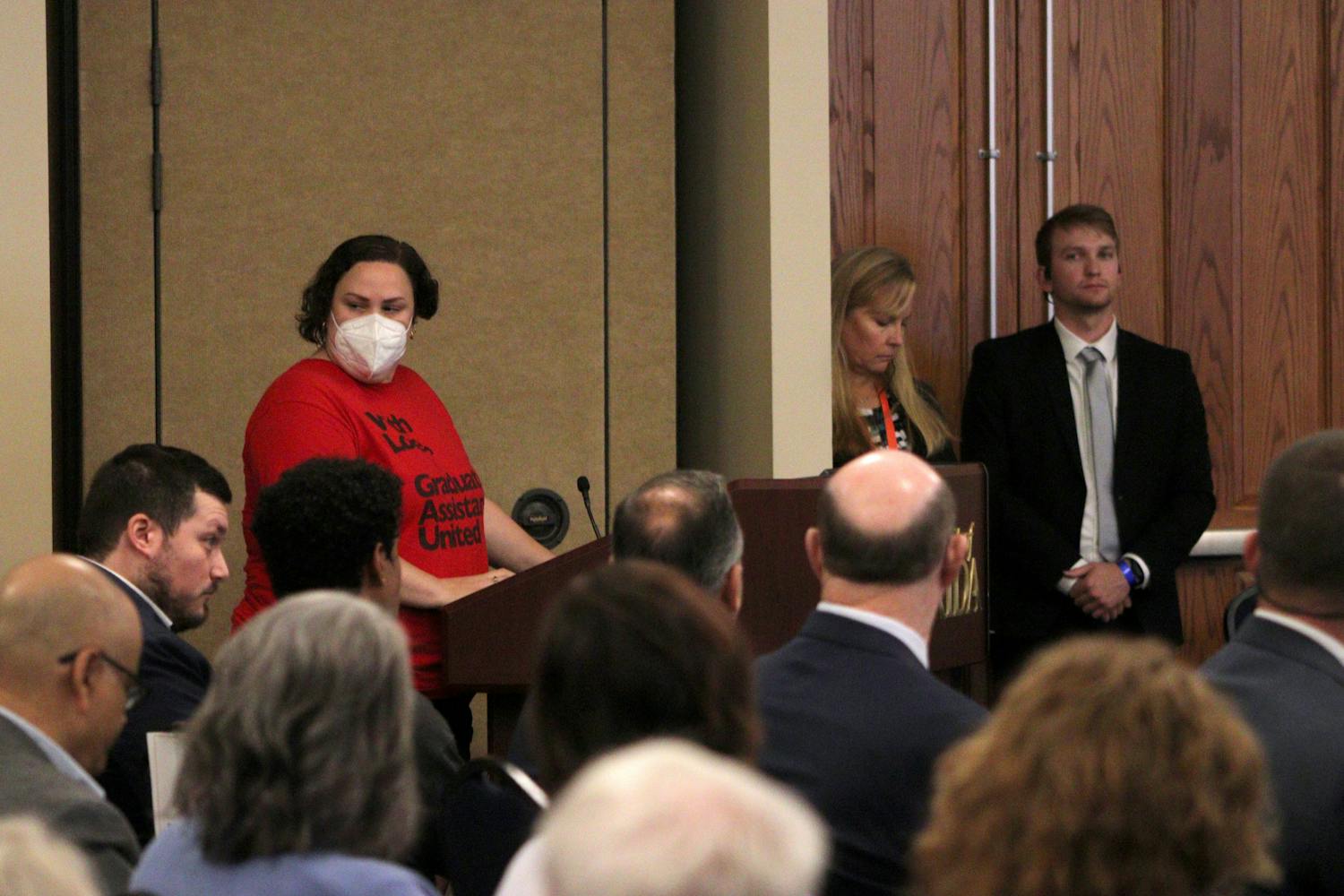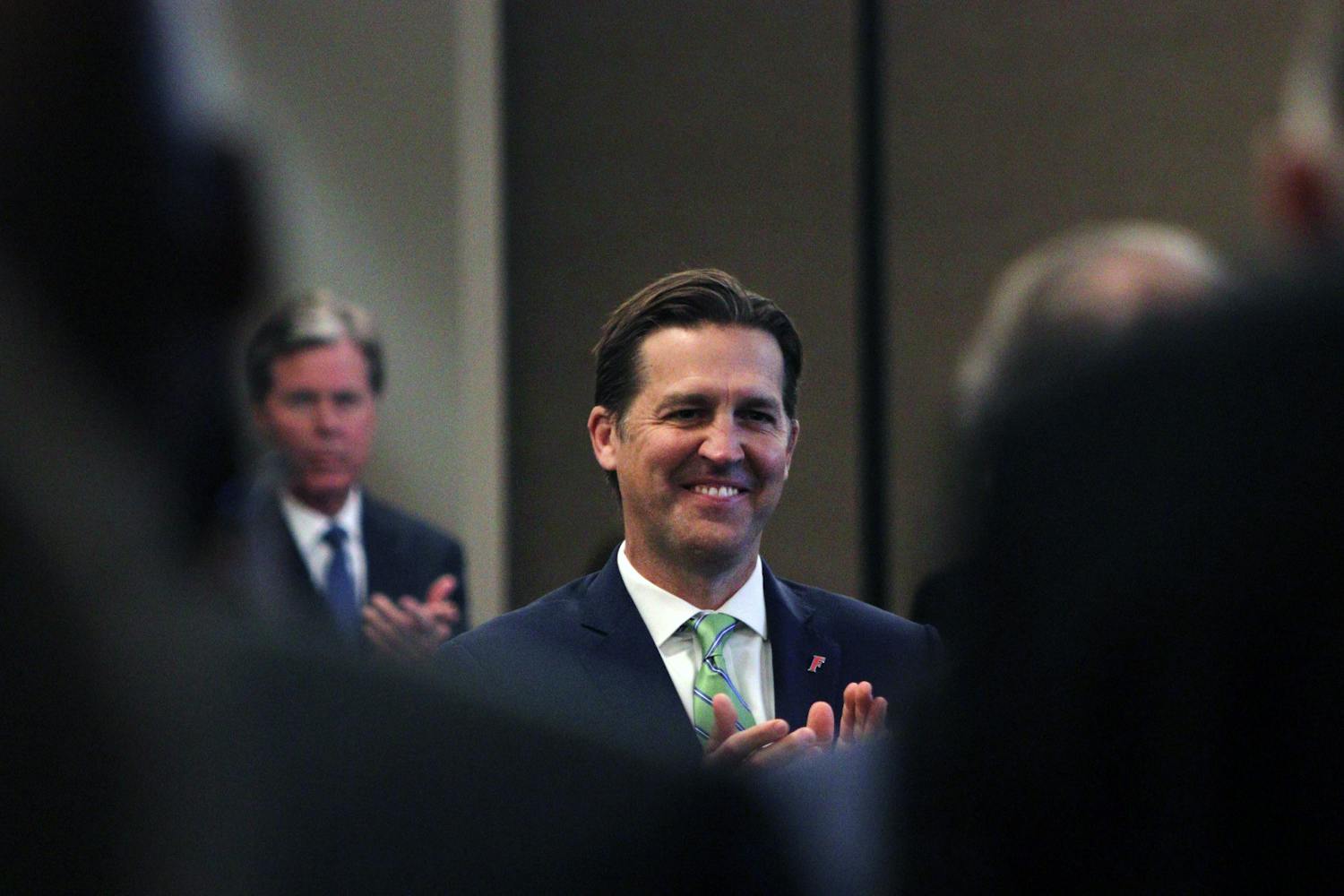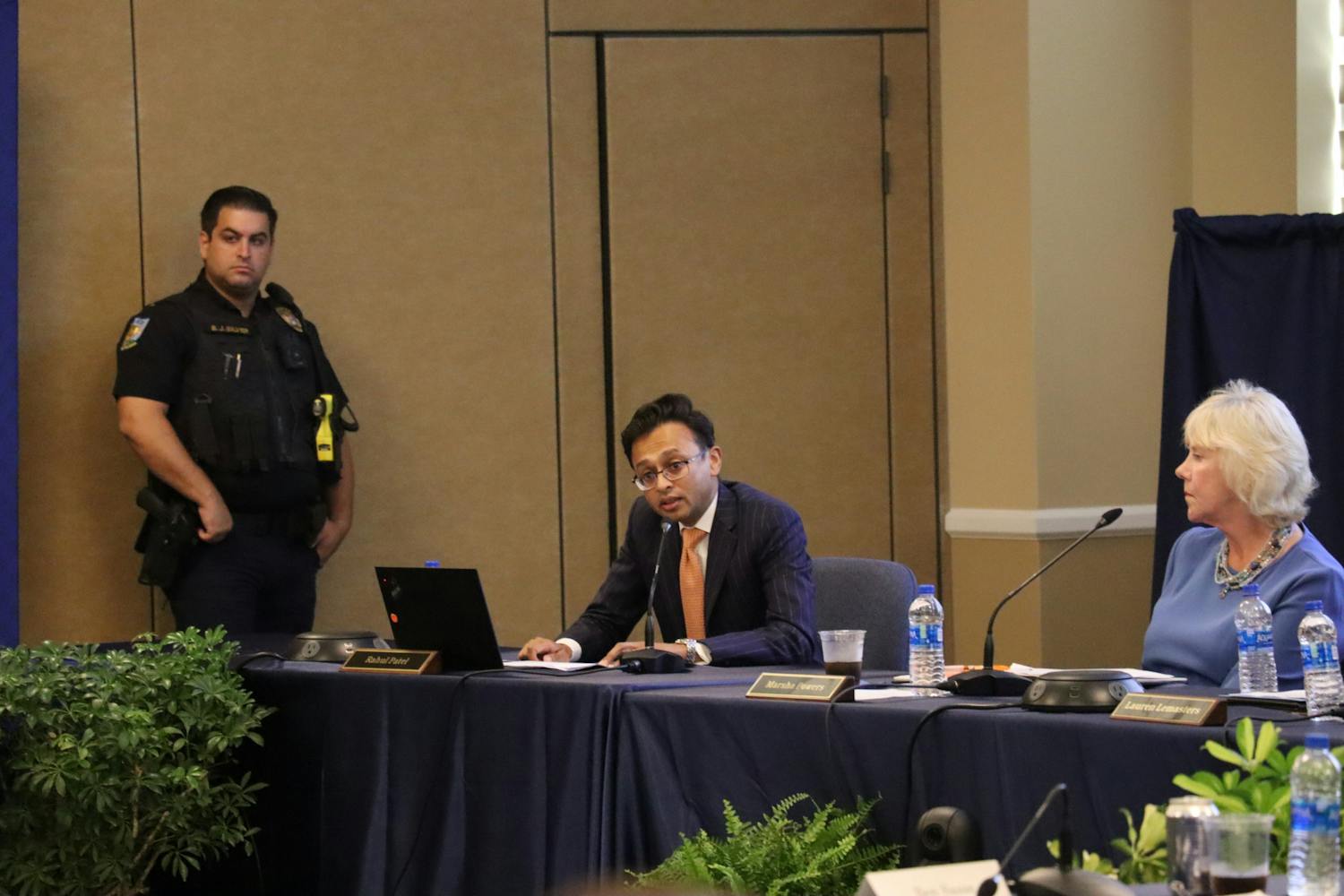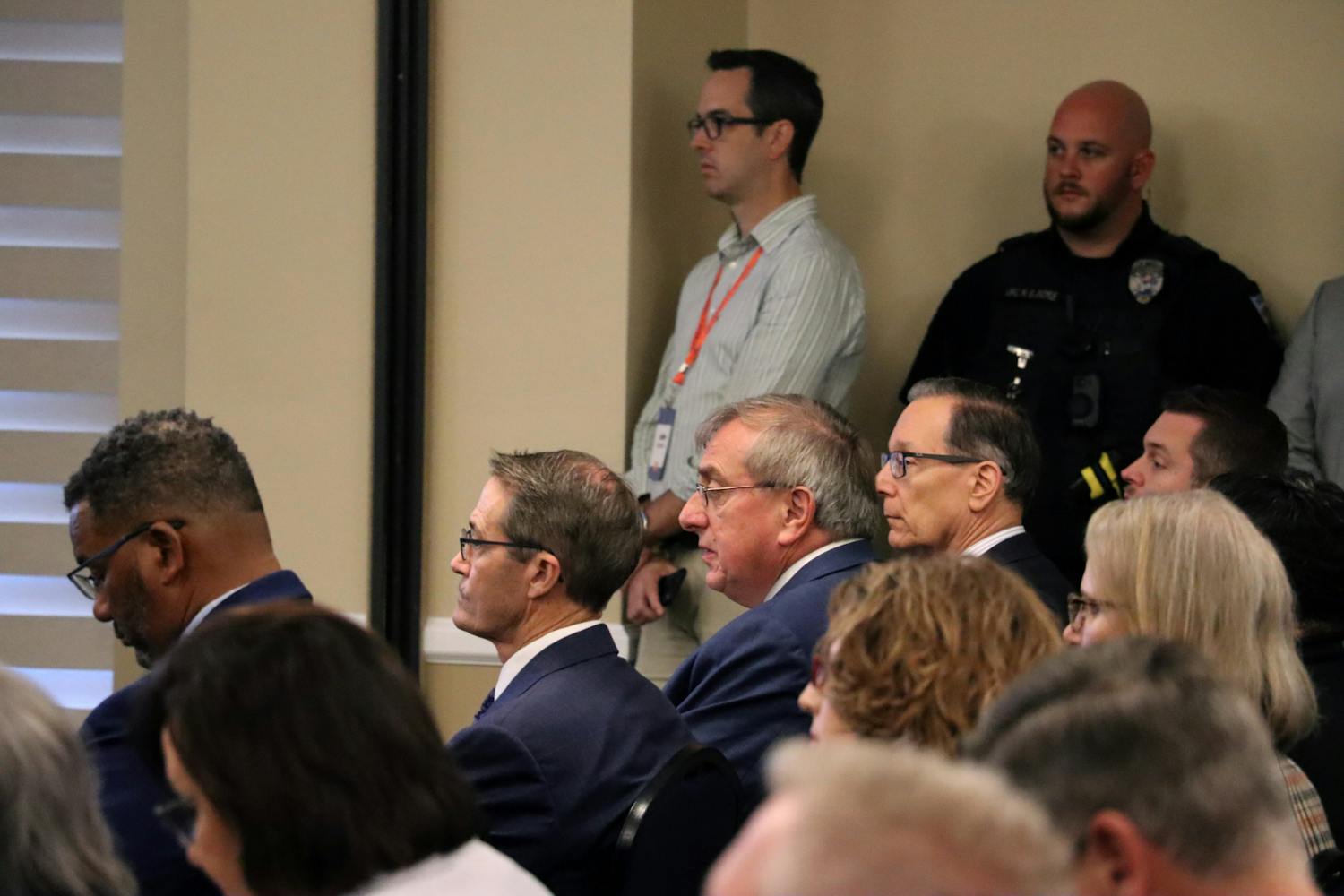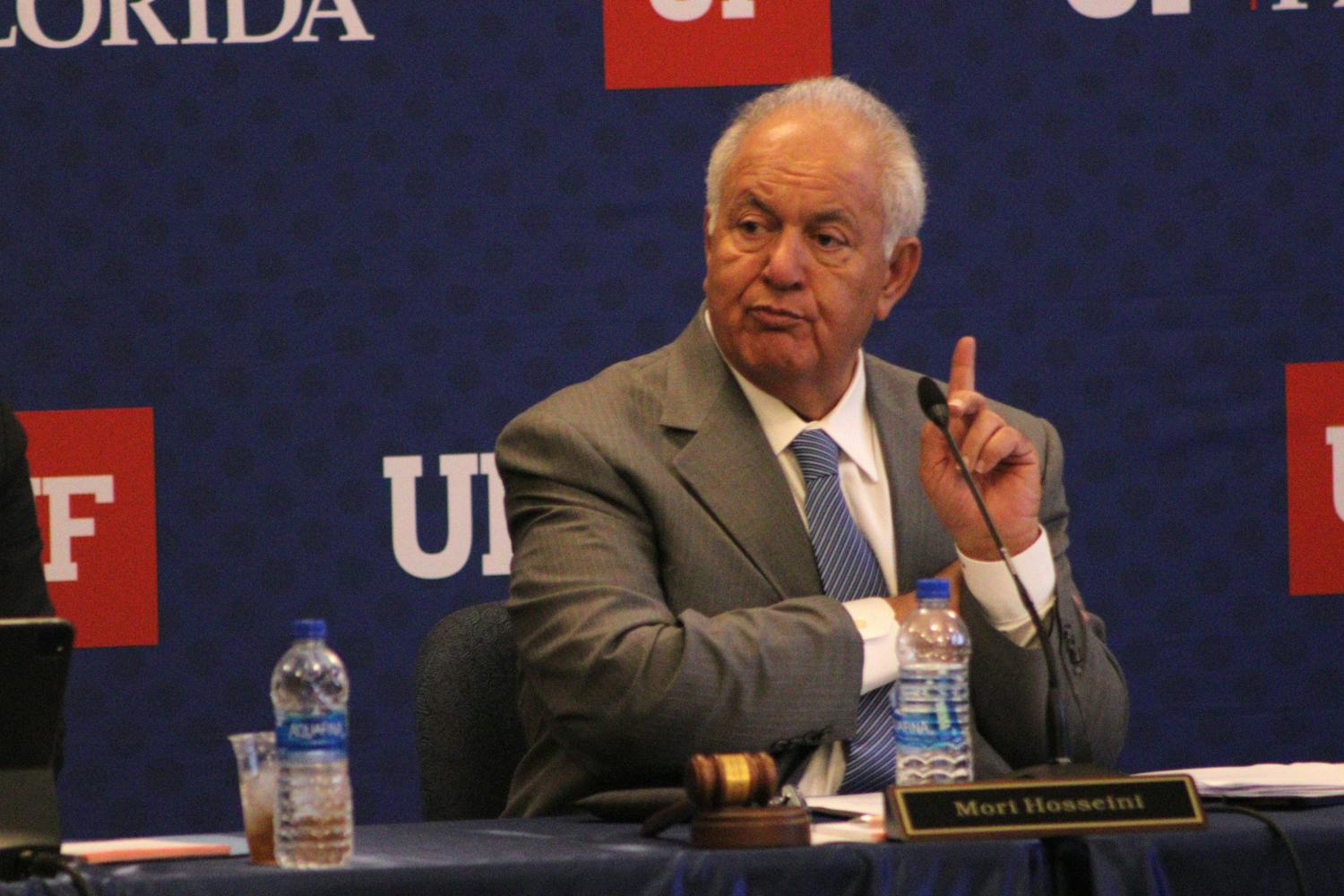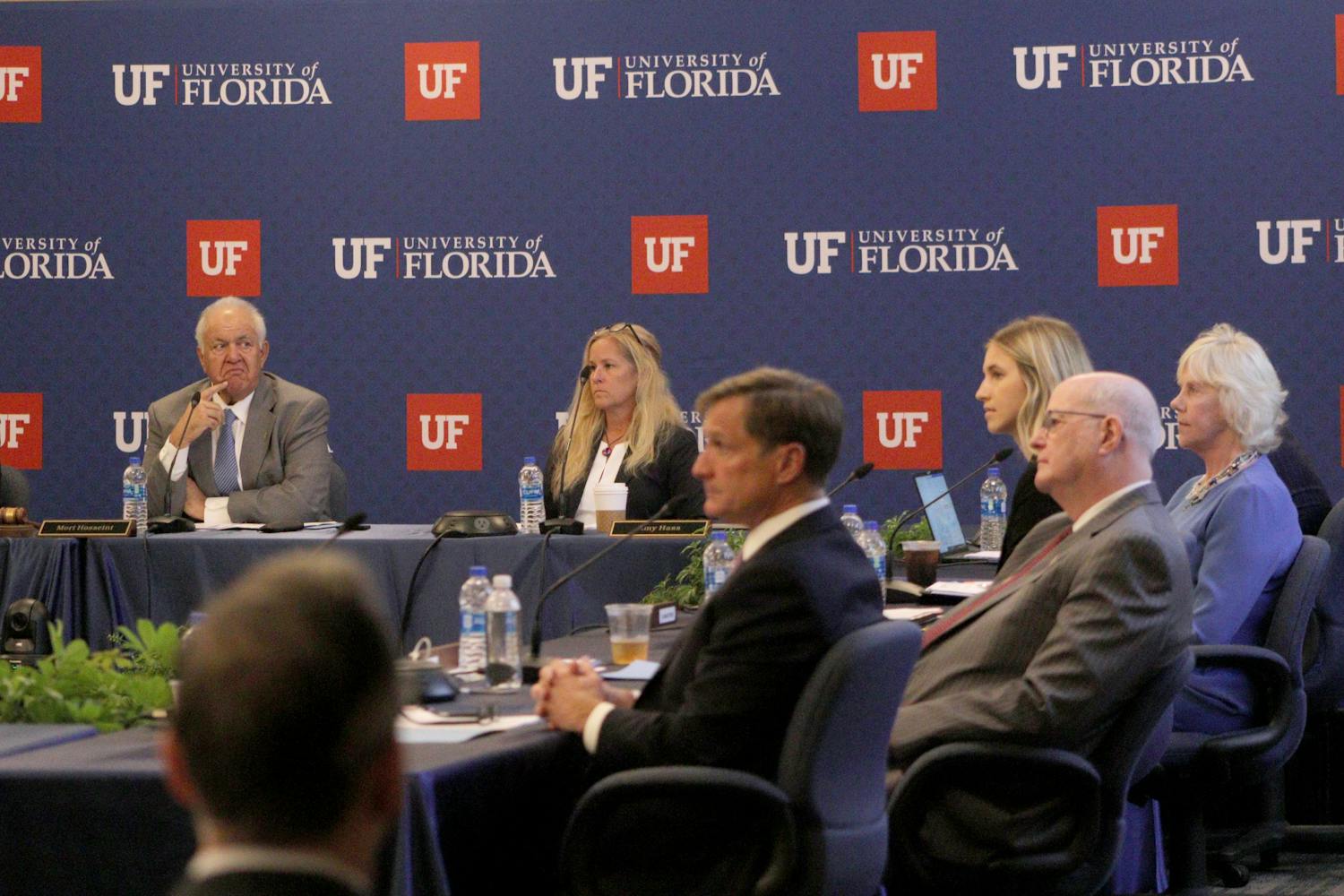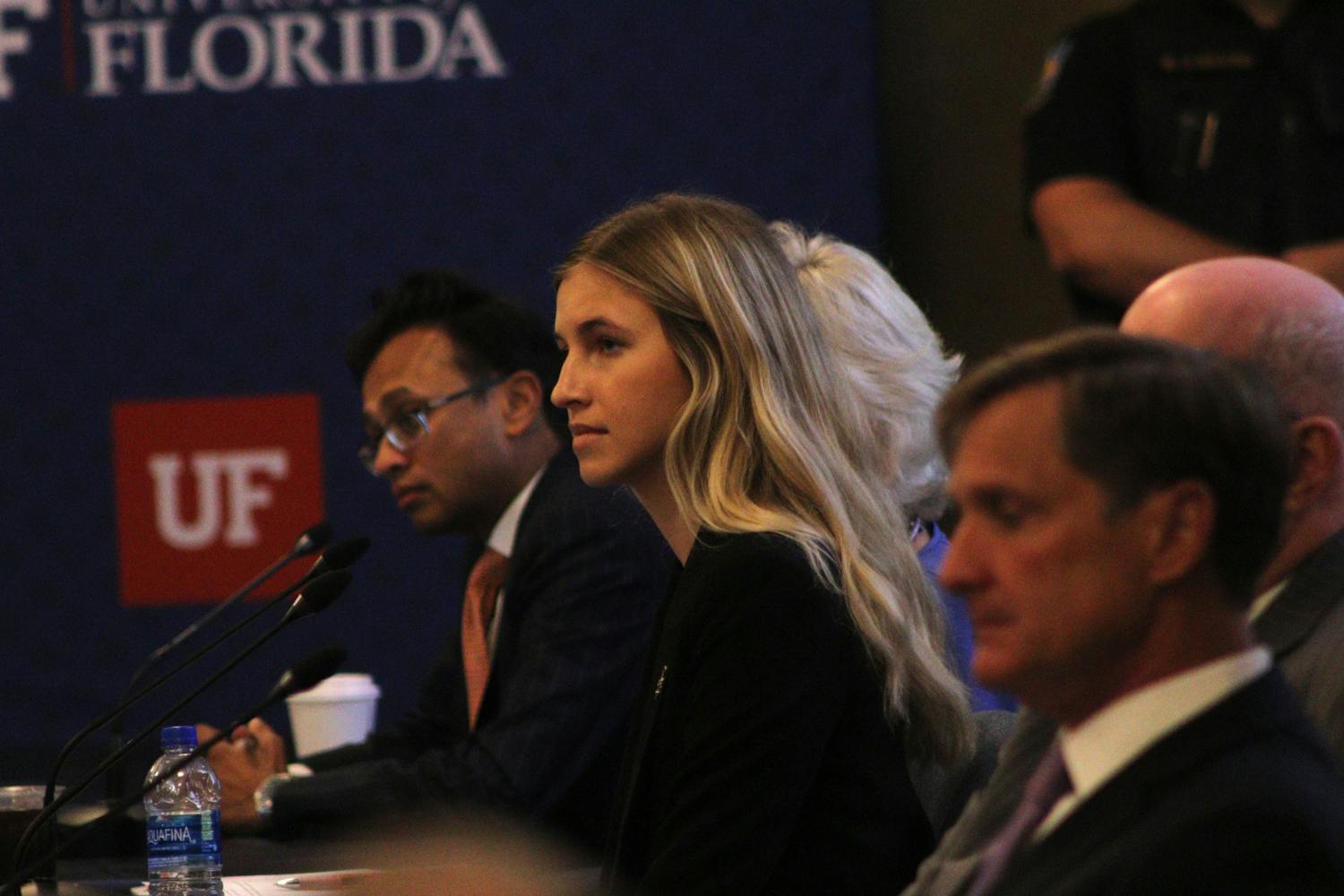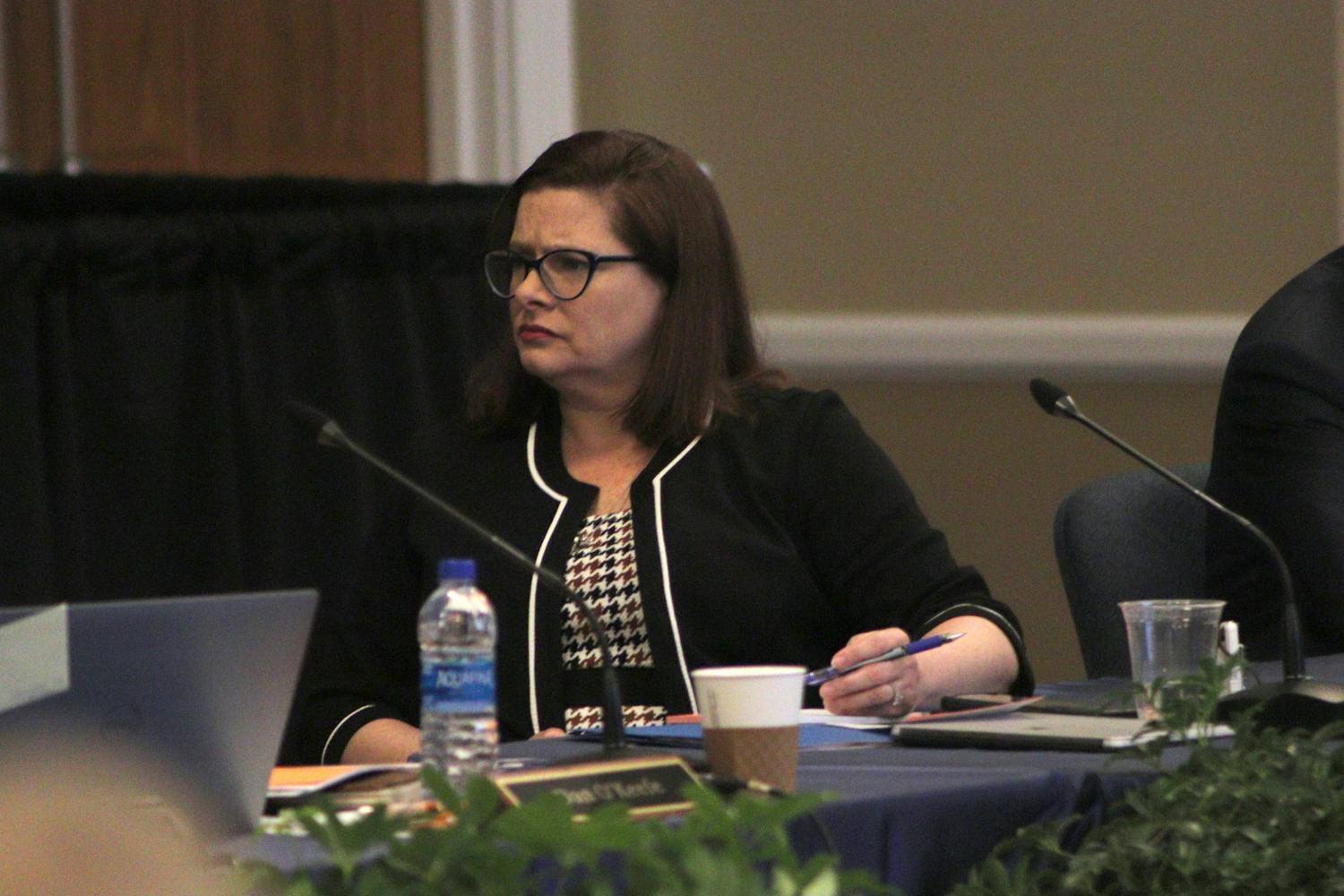Sen. Ben Sasse was confirmed by a unanimous vote from the UF Board of Trustees to become the university’s 13th president, to applause at Emerson Alumni Hall on Tuesday.
All that remains for Sasse’s candidacy to become a presidential transition is a vote by the Florida Board of Governors later this month, one that Sasse is widely expected to pass.
U.S. Sen. Ben Sasse, R-Nebraska, returned to UF campus Tuesday to be interviewed by the Board of Trustees. If selected, Sasse will succeed President Kent Fuchs as UF’s 13th president.
The interview, which began at 10 a.m., took place in Emerson Alumni Hall’s President’s Ballroom. The meeting was open to public comment and livestreamed for those unable to attend.
Sasse’s first formal UF appearance Oct. 10 — a series of three Q&A forums addressing faculty, students and staff — was cut short when over 300 protesters moved up Emerson Hall’s spiral staircase and flooded the President’s Ballroom, drowning out the senator’s responses.
In anticipation of the Board of Trustees interview, Fuchs circulated a university-wide email Oct. 24 announcing students may be punished by the university under the Student Conduct Code if they protest inside Emerson Hall — enforcing a decades-old policy regulating student protests. Monday, an advisory statement from the UF News website reported there would be a clear bag policy for those attending the interview.
Sasse voted in, trustees express support at 1:40 p.m.
Before Sasse was unanimously voted in, the trustees took turns expressing their full-fledged support for the senator.
Chair Mori Hossieni called for a motion to begin a discussion among trustees to give their final views on Sasse’s candidacy. One by one, each spoke incredibly highly of Sasse and what many saw as his ability to be an effective and transformative leader.
Phalin lauded Sasse for addressing concerns she had been hearing from faculty, such as on the treatment of Chinese faculty, his views on LGBTQ rights and his pledge to stay away from partisan political views or pressures.
Student Body President Lauren Lemasters said that she looked forward to seeing Sasse listen to the student body.
“I look forward to, throughout my experience, seeing you ready to sit down and listen and learn from these students — to hear their concerns, to hear their big ideas,” Lemasters said.
Search Committee Chair Rahul Patel said he felt a Sasse presidency would put UF on the march to become one of the most important public universities in the country, alongside the likes of the University of California, Berkeley and the University of Michigan.
Sasse is a transformative candidate, Patel said, which is why he wholeheartedly supports his vote to become the next UF president.
AI, athletics and relationship with China guide interview's second half at 12:26 p.m.
Trustee Marsha Powers asked for Sasse’s further thoughts on artificial intelligence, which has served as one of the university’s leading initiatives for expanding technology on campus. AI could be used to give students a more holistic education, Sasse said.
“It’s clearly the case that a generally educated American adult needs some quantitative and STEM literacy,” Sasse said. “[They] need to understand which questions are quantitative and which questions are qualitative.”
When asked about his vision for UF Health, Sasse said he sees massive opportunities in UF Health to provide services to areas in North Florida outside of Gainesville and Jacksonville.
Confronting antisemitism was a concern of Richard Cole, who asked the senator how he would handle the issue.
Sasse applauded UF and University of Georgia for their condemnation of the antisemitic message projected on the exterior of Florida-Georgia football game Oct. 29 in Jackonsville’s TIAA field.
Cole added Chinese students have expressed fear of Sasse because of his open opinions about China. He asked Sasse how he would make them feel safe.
“Evidently, I haven’t done a good job of making [my views] clear,” Sasse said. “I have a very pro-Chinese person and citizen position, I have a very anti-Chinese Communist Party position.”
Sasse spoke about the need of UF to take in international students from a variety of places around the world.
“There’s no ‘anti-China’ position,” Sasse said. “There’s an anti-[Chinese Community Party] genocide position.”
The conversation then shifted to discuss UF’s athletic program and how it fits into Sasse’s vision.
“I believe deeply in athletics,” Sasse said. “I think they’re not the most important thing, but in some ways it's the most important daily thing.”
Sports is an important outlet for people to express tribal identity, he said, and a healthier one than politics.
UF infrastructure was a frequent topic from Sasse, both in the discussion of repairing UF buildings and the construction of new ones.
For the university to ensure student success, infrastructure needs to be in good shape, Sasse said.
Sasse referenced UF’s recent graduate campus project in West Palm Beach as the probable subject of his second conversation with Patel. Gainesville will always be the heart of UF, Sasse said, but there should be more consideration to geographic expansion when it comes to graduate school and hybrid programs for part-time students.
With South Florida’s emerging tech economy, a footprint in West Palm could be as important as one in Gainesville, he said.
“We shouldn’t be threatened by the fact we need to rethink a lot of things,” Sasse said. “We should see it as an opportunity.”
Phalin returned to the question of Sasse’s position on China, asking if he would profile faculty and assume they were members of the CCP.
He’d assume quite the opposite, and that he regularly meets with Chinese dissidents, he said. He would assume that people at UF believe in freedom and dignity.
When asked about his capacity to get federal funding, Sasse said he needed to exercise caution in his response because he hadn’t had legal advice on how to speak on the matter.
For the last question, Patel asked Sasse about his general thoughts on the research mission of the university.
"I mean, I'm sure there's a political trap I could step in somewhere by accident," he said.
He said it's great how many UF researchers get to pursue their passions. He also jokingly referred to Massachusetts Institute of Technology as "Disneyland for nerds."
Political influence, LGBTQ stance sets interview’s tone at 12:06 p.m.
Vice Chair Thomas Kuntz asked about Sasse’s vision for the university, as well as how he’ll gain students’ and faculty’s trust.
“There’s a ton of listening and learning I need to do,” Sasse said.
Sasse emphasized the expansion of career services to address the growing tech scene in Miami and to use UF’s expanding artificial intelligence and technological infrastructure to bring in top minds.
Political neutrality was another topic of discussion at the forefront of Sasse’s interview.
Sasse said he felt he shouldn’t be reduced to political positions held at different periods of his life.
“I find it super appealing to step back from politics for a time,” Sasse said. “I would have no activity in partisan politics in any way as I arrive at the University of Florida.”
He told the board that he would take a vow of political celibacy, meaning he wouldn’t attend political events, take political contributions or openly support candidates.
Sasse expressed excitement at UF’s role in the state as a land-grant university, which is a higher education institution that receives federal benefits to support agricultural sciences. , He said this status is a huge opportunity for the university to have a larger footprint in the state.
Faculty Senate President Amanda Phalin then took the floor to ask some questions on behalf of faculty concerns. The first issue she brought forth was Sasse’s potential contact with the governor’s office about the job.
Sasse said he hadn’t had a conversation with Gov. Ron DeSantis since 2016, and denied that the governor’s office had any role in his candidacy to become UF president.
If anything, Sasse said, the people on the president search committee, particularly Patel, served as “shepherds” to convince him to go forward with being the presidential finalist.
Sasse also said going to Tallahassee and advocating for UF would be a big part of his job.
“I think Tallahassee knows that UF is a massive tool that needs to be used more effectively to bring people to the state and invest in 2023-2024,” Sasse said.
Phalin and Lemasters also questioned if Sasse would commit to current UF initiatives to advance LGBTQ and women’s rights on campus, including access to contraceptives and transgender healthcare.
“I expect my record to be fairly indistinguishable to [President Fuchs],” Sasse said, adding that he would have to become more familiar with those issues.
Lemasters followed up, asking Sasse about student life and experiences. He emphasized the importance of learning from difficult experiences and building character.
“Most of the life transformation isn't in a classroom,” Sasse said. “It's not inside these four walls. It's the network that you've built. It's the tears that you shed with the people. It's the worldview implications that you only stumbled across at seven o'clock in the dining hall.”
Trustee Anita Zucker asked if he could influence legislation that deals in academic freedom. Sasse said that UF needs to be well-managed by the state but not micromanaged.
Interview kicks off with Sasse’s vision at 11:30 a.m.
Chair Hosseini began the interview with Sasse, calling it the board's most important job as trustees.
To begin, Hosseini asked Sasse to speak on why he was interested in the presidency of UF and what his vision for the future of the university is.
Sasse emphasized the importance of adapting to technological disruption and preparing students to be lifelong learners in a modern economy where many people may have to change careers throughout their lives. He said that massive change at UF was needed in order for it to stay relevant in the future, change that for which humility would be needed.
“Large portions of higher education appear more complacent and self-satisfied, rather than more innovative and more humble, more inclined to seek experimentation and a greater number of partnerships,” Sasse said.
“This is the most interesting institution in the most economically dynamic state right now,” praising Florida’s expanding economy and saying that workforce preparation is an essential element of a university’s role.
“I am a romantic when it comes to the importance of education,” Sasse said. “Students aren’t machines and universities aren’t assembly lines.”
Sasse questioned whether or not modern universities are properly preparing their students for the workplace, which he said is an essential element of higher education, and if universities are able to provide broad offerings of why they’re important to people’s future.
Sasse said he envisioned a 12-18 month presidential transition period.
Sasse emphasized the importance of the South Florida initiative, the expansion of UF Health, the next steps on incorporating more AI across UF curriculum, and nailing down the next targeted benchmark in the U.S. News & World Report rankings.
“There is so much more about AI that we can learn in this moment,” Sasse said. “And all the ways that we can serve more students in more ways, to learn more about the beautiful diversity of this creation.”
Sasse finished his opening statements by saying a healthy university understands the importance of diversity of thought, prepares students for lifelong learning and works to expose students to a wide range of opinions to help them think critically.
Board of Trustees Mori Hosseini speaks at 11:11 a.m.
Hosseini described a proactive search process by the committee when he spoke on concerns on its transparency.
He said that prospective candidates were crystal clear that they demanded confidentiality, otherwise, “none of the top twelve people we interviewed would have stayed in the process,” Hosseini said.
Hosseini went on to name an exhaustive list of other public universities whose presidential searches also came down to a sole finalist.
10:45 a.m.
Presidential Search Committee chair Rahul Patel then began with a speech about the process that led to Sasse’s sole candidacy.
Patel went through the members of the search committee and their qualifications and background — all handpicked by Chair Hosseini, according to Patel. The committee’s role was to advise the board in the selection of a new UF president.
“We have support from the governor and the state legislature that is unparalleled in the country,” Patel said.
Patel said he held 25 one-on-one listening sessions, and the search committee held 16 group listening sessions. He also detailed the search subcommittee and their roles in the process, such as compensation and the transition process.
The committee reached out to academics of various leadership backgrounds. He said they reached out to hundreds of prospects, and Patel personally spoke with 35 of them — all of whom asked questions about the process and wanted confirmation that they’re names wouldn’t be disclosed unless they were given the final position, Patel said.
Patel said the final short list of dozen prospects met with the search committee; the makeup of whom were nine presidents of R1 research universities, seven presidents of AAU universities, and more than half were women or non-white, Patel said.
Patel said candidates were especially drawn to UF because of the support they felt the university gets from the state.
The search was then refined down to six members of the short list — a shorter list, if you will — that comprised of five university presidents and Sasse, Patel said. He reiterated that none of the candidates were willing to be publicly named unless they were the sole finalist.
The group of six was later voted down to one by unanimous vote of the search committee.
Public comment ended at 10:37 a.m.
Hosseini’s comments before the interview emphasized how proud he was of the board, the president and his cabinet for UF’s success and growth over the past 8 years.
“Every single one of you around this table cares deeply about this university and you do what you know in your heart is best for UF,” Hosseini told the board.
Hosseini said UF’s standing in the U.S. News & World Report ranking was indicative of the board’s hard work and bold vision; along with increases in faculty pay and undergraduate applications, a decrease in the faculty-student ratio. He cited numerous statistics and UF initiatives, especially in Artificial Intelligence, to bring home the point that UF is on the grow, and plans for expansion and potential of the university are not slowing down.
“It’s because we rolled up our sleeves and got to work, and didn’t stop,” Hosseini said.
10:15 a.m.
The next speaker said Sasse was too unknowledgeable of the specific issues at UF in his public forums earlier this month to inspire confidence in his candidacy.
“The board should be extremely concerned by the reputation of this school if Sasse becomes president,” she said.
She urged greater transparency and inclusivity of the UF community in presidential search.
The next speaker emphasized the recent UF scandals regarding academic freedom and political meddling.
“The faculty and students have been nearly unanimous in opposition against the search committee's decision,” he said, mentioning the Student Senate and UF Faculty Senate votes of no confidence.
“You all really f—-d up,” he told the board.
Oscar Santiago Perez, a student senator and a member of the LGBTQ advisory committee, blasted Sasse’s appointment in light of UF’s history of bigotry towards queer people and Sasse’s comments on gay marriage and opposition to the Defense of Marriage Act.
“I hope he understands he will have a huge hill to climb, a hill of trust, a big responsibility,” Perez said.
Riley Moon, UF CLAS student, said Sasse’s vying for the top spot at UF was a betrayal to his constituents in Nebraska and that nothing of his experience in the Senate would prepare him for the presidency.
They also brought up Sasse’s comments jokingly disparaging the UF football team at the 2018 National Summit on Education Reform.
“I’m here to present our voice, a resounding ‘No’ to Sen. Sasse,” Moon said, blasting UF for they she said was neglecting the UF staff throughout the search process
“Our mascot is a gator, not an elephant,” she said, on what she felt was an appointment dripping in politics “UF deserves better than Ben Sasse.”
Mikhail Mikhaylov said Sasse pledged to create a culture of inclusivity at UF, and called topics of mental health to be included in future questioning of candidates and search processes.
10 a.m.
At the President’s Ballroom of Emerson Alumni Hall, the morning belonged to the suits. The air smelled of one of the upper-echelon tax brackets. In the minutes leading up to Sasse’s interview — one that would determine whether or not his future will be in the president’s mansion — voices became hushed in anticipation of the culmination of a controversial university presidential search that made national headlines.
It began with an audio check from Board of Trustees chair Mori Hosseini, and then a good morning to the room.
All of the UF trustees were in attendance in the secretary’s roll call. Hosseini first called for the room to recognize President Fuchs and his cabinet with a round of applause. The chair then recognized Senator Sasse before public comment began.
The first commented Paul Wassel — who was told that commenters will have three minutes each to express their thoughts. Wassel made it clear that from his impression from the campus community, there was little support for presidential search and Sasse himself.
“We as a whole do not want Dr. Sasse as the president of our institution,” Wassel said.
Wassel told Sasse that it would be an uphill battle to win the trust of UF, and that he hopes that the Senator will
Bryn Taylor,co-president of UF Graduate Student United, went next. She told Sasse that the search committee confirmed graduate student fears of a political appointment by picking a sitting U.S. Senator.
“He knows nothing of state funding universities,” Taylor said of Sasse. “He knows nothing of research.”
Taylor urged the trustees not to allow UF to become DeSantis’ personal political playground.
Taylor was followed by Rachel Hartnett, co-president of GAU, who said the presidential search was rigged from the start. She blasted the university for not allowing graduate student representation on the presidential search committee; and flatly said Sasse was not qualified for the job.
Sasse sat cross-legged through the comments, facing the speakers with a flat expression.
Tara said she has been in Gainesville since she began at UF in 1999, a Gator through and through, she said. Tara said Sasse’s most recent book, “Them,” gave her hope in his leadership credentials and vision for the country.
Tara criticized the protesters and politicized the search process for being unwelcome and not keeping an open mind on Sasse.
The next speaker, Nathaniel Pelton, said that UF was being corralled into a decision by the Board of Trustees.
“We pay the money for those cushy seats you’re sitting in,” he told the board. “And you select a man who is very littered in political history.”
Contact Christian Casale at cccasale@alligator.org. Follow him on Twitter @vanityhack.
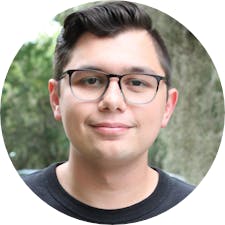
Christian Casale is a history senior and the university desk editor for The Alligator. In his spare time, he loves writing his bio for the website and watching movies alone in the dark.


